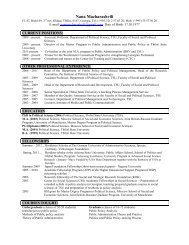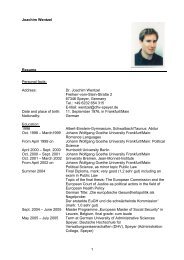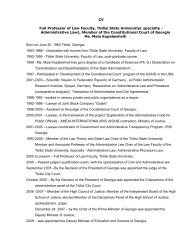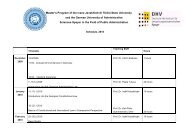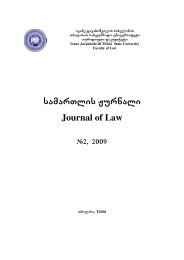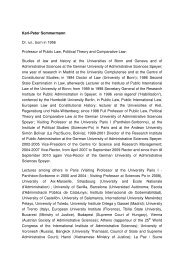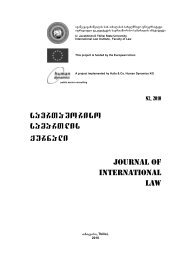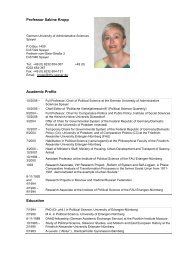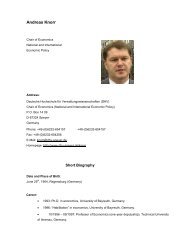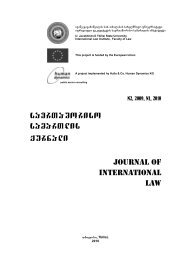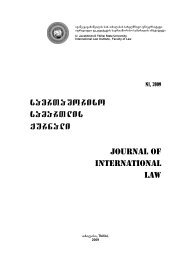Untitled
Untitled
Untitled
Create successful ePaper yourself
Turn your PDF publications into a flip-book with our unique Google optimized e-Paper software.
saerTaSoriso samarTlis Jurnali, #1, 2008 JOURNAL OF INTERNATIONAL LAW, N1, 2008<br />
LEVAN ALEXIDZE<br />
VITAL ROLE OF OSCE IN CONDEMNING<br />
ETHNIC CLEANSING OF GEORGIAN POPULATION<br />
IN ABKHAZIA, GEORGIA, BY THE INTERNATIONAL COMMUNITY<br />
At its sixty-second session, on 29 May 2008,<br />
the General Assembly of the United Nations<br />
adopted extraordinary Resolution concerning<br />
the “Status of internally displaced persons and<br />
refugees from Abkhazia, Georgia”, which for the<br />
first time in the UN practice acknowledged the<br />
fact of ethnic cleansing of Georgians in Abkhazia.<br />
The Resolution reads as follows: “Recalling<br />
all relevant Security Council resolutions,<br />
and noting the conclusions of the Budapest<br />
(1994), Lisbon (1996) and Istanbul (1999)<br />
summits of the Organization for Security and<br />
Cooperation in Europe, in particular the reports<br />
of “ethnic cleansing” and other serious<br />
violations of international humanitarian law in<br />
Abkhazia, Georgia…<br />
Emphasizes the importance of preserving<br />
the property rights of refugees and internally<br />
displaced persons from Abkhazia, Georgia,<br />
including victims of reported “ethnic cleansing”,<br />
and calls upon all Member States to deter<br />
persons under their jurisdiction from obtaining<br />
property within the territory of Abkhazia,<br />
Georgia, in violation of the rights of returnees…”<br />
1<br />
It is noteworthy that from the very outset<br />
of the conflict the United Nations Security Council,<br />
as well as General Assembly avoided<br />
acknowledging “ethnic cleansing” in resolutions<br />
adopted by them; however, by 1992-<br />
1993 definition of a crime against humanity<br />
such as “ethnic cleansing” was increasingly<br />
introduced. And what is more, the growing<br />
occurrence of crimes in the territory of the<br />
former Yugoslavia persuaded the United Nations<br />
General Assembly to acknowledge “ethnic<br />
cleansing” as a form of genocide, which<br />
was exercised through mass killing, torture,<br />
terror and other inhuman means against a<br />
group of people of other ethnic origin. 2<br />
On 24 May 1994 the Final Report of the<br />
Commission of Experts established by the<br />
United Nations Security Council was published,<br />
which provided for a concept of “ethnic cleansing”,<br />
defined as follows: “ethnic cleansing”<br />
is a purposeful policy designed by one ethnic<br />
or religious group to remove by violent and<br />
terror-inspiring means the civilian population<br />
of another ethnic or religious group from certain<br />
geographic areas. To a large extent, it is<br />
carried out in the name of mis-guided nationalism,<br />
historic grievances and a powerful driving<br />
sense of revenge. This purpose appears<br />
to be the occupation of territory to the exclusion<br />
of the purged group or groups”. 3<br />
Another report mentioned that “this policyis<br />
implemented through the following means:<br />
killing, torture, illegal detention and imprisonment,<br />
illegal executions, rape and sexual violence,<br />
placing civil population in ghettos,<br />
forced displacement, deportation, purposeful<br />
armed attacks on civilians and civilian objects,<br />
or threatening such an attack”. 4<br />
Such a definition fully fits the frame of definition<br />
of genocide, but an emphasis was still<br />
shifted to “ethnic cleansing”, as Muslims represented<br />
a small part of the multi-million population<br />
in Bosnian Serbia of Bosnia and Herzegovina.<br />
Formally, as defined by lawyers, in<br />
order to be recognized as a victim of genocide,<br />
person shall belong to a specific minority<br />
group, which is not a part of majority population<br />
living throughout entire territory of a<br />
country (the Muslim population living in Bosnia<br />
and Herzegovina was considered to be<br />
such a group).<br />
40



